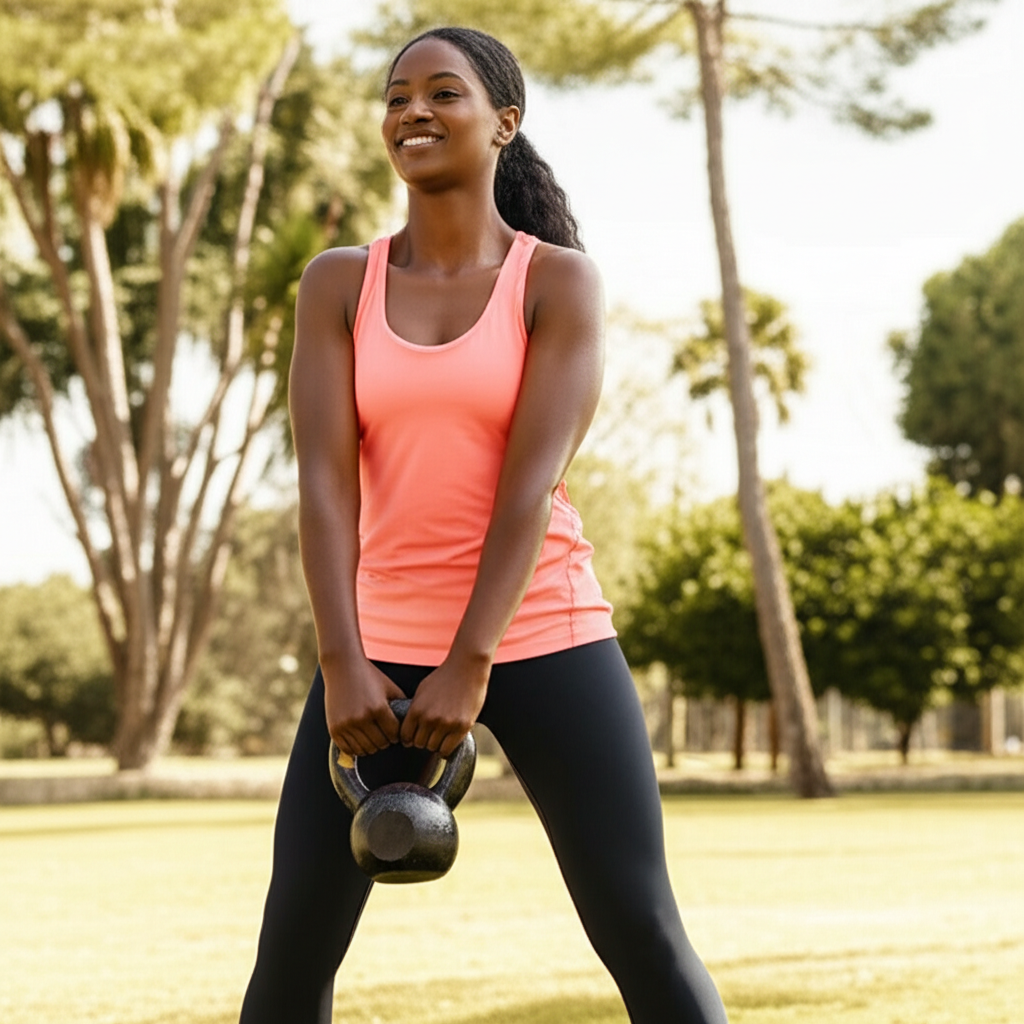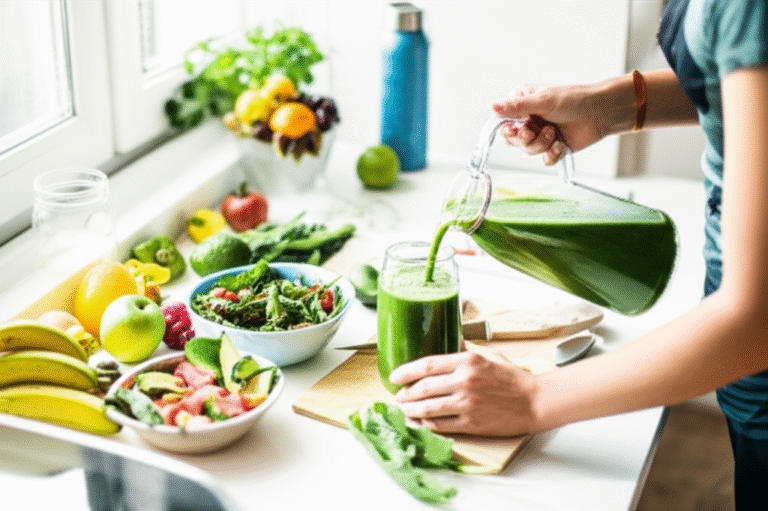Weight Loss With Kettlebells: Effortless Gains
Kettlebells offer a dynamic and efficient way to achieve weight loss with surprisingly effortless gains. Combining strength and cardio, these versatile tools can help you burn calories, build muscle, and boost your metabolism for sustainable fat loss, all from the comfort of your home.
Do you ever feel like you’re stuck on a weight loss hamster wheel, running hard but not seeing the results you desire? You’ve tried fad diets, joined countless gym memberships, and maybe even sweated through grueling workout routines, only to feel defeated by stubborn pounds. It’s easy to feel discouraged when your efforts don’t seem to match your goals. But what if losing weight wasn’t about deprivation or extreme measures, but about embracing a more holistic and enjoyable approach? What if the secret weapon for shedding those extra pounds was a simple, yet incredibly effective tool that delivers powerful results? Get ready to discover how embracing weight loss with kettlebells can be your most approachable, sustainable, and even enjoyable path to a fitter, healthier you.
Why Kettlebells Are a Beginner’s Best Friend for Fat Loss

When you think of weight loss, you might picture endless hours on a treadmill or meticulously counting every calorie. While these methods can work, they often feel like a chore. Kettlebells, on the other hand, bring a unique blend of strength training and cardiovascular exercise that can make fat loss feel less like a battle and more like an empowering journey.
Kettlebells are wonderfully versatile. They allow for a full-body workout, engaging multiple muscle groups simultaneously, which is key for maximizing calorie burn. Unlike traditional dumbbells, the unique design of a kettlebell—with its offset center of gravity—requires more stabilization from your core and stabilizer muscles. This means you’re not just working your arms or legs; you’re building functional strength and improving your coordination with every swing and lift.
One of the biggest advantages of incorporating weight loss with kettlebells is their ability to boost your metabolism. Strength training, which kettlebell exercises excel at, helps build lean muscle mass. The more muscle you have, the more calories your body burns even at rest. This “afterburn” effect is crucial for long-term weight management. Furthermore, the dynamic movements of kettlebell workouts elevate your heart rate, providing an excellent cardiovascular challenge that torches calories during your workout and beyond.
For beginners, kettlebells offer an accessible entry point into strength training. While proper form is always important, many foundational kettlebell exercises are relatively simple to learn and can be modified as you progress, ensuring you can build confidence and see tangible results without feeling overwhelmed.
Effortless Gains: How Kettlebells Torch Calories
The “effortless gains” with kettlebells come from their ability to create a high-intensity workout that engages your entire body. This type of training is incredibly efficient for calorie expenditure. Let’s break down why:
- Compound Movements: Kettlebell exercises like the swing, clean, and squat work multiple large muscle groups at once. When you use more muscle, you burn more calories. A study published in the Journal of Strength and Conditioning Research highlighted that kettlebell exercises can lead to significant calorie expenditure comparable to traditional cardio.
- Metabolic Boost: Building lean muscle mass through strength training with kettlebells increases your resting metabolic rate. This means your body becomes a more efficient calorie-burning machine, even when you’re not actively exercising.
- Cardiovascular Challenge: The dynamic, flowing nature of many kettlebell exercises—especially the swing—gets your heart rate up quickly. This not only burns calories during the workout but also taps into the afterburn effect (EPOC – Excess Post-exercise Oxygen Consumption), where your body continues to burn calories at an elevated rate for hours after you finish.
- Improved Coordination and Core Strength: The offset weight of a kettlebell demands constant core engagement and improves your balance and proprioception. A stronger core translates to better form in all exercises, reducing injury risk and allowing you to push harder and more effectively.
Imagine simply swinging a weight back and forth and feeling your heart pound, your muscles work, and knowing you’re torching calories. That’s the beauty of the kettlebell swing—it’s a powerful, full-body exercise that’s deceptively effective for weight loss.
Getting Started: Your First Steps with Weight Loss with Kettlebells
Starting your weight loss journey with kettlebells is about preparation, proper technique, and a sensible progression. Don’t worry about lifting heavy right away; focus on learning the basics.
Step 1: Choosing Your Kettlebell
- For Women: A good starting weight is typically between 8-12 kg (18-26 lbs).
- For Men: A good starting weight is usually between 12-16 kg (26-35 lbs).
It’s better to start too light and focus on form than too heavy and risk injury. You can always buy heavier kettlebells as you get stronger. Look for kettlebells with smooth handles that don’t have any rough edges.
Step 2: Mastering the Fundamentals
- The Kettlebell Swing: This is the king of kettlebell exercises for a reason. It engages your glutes, hamstrings, back, and core, providing a massive calorie burn. The key is to hinge at your hips, keeping your back straight, and explosively drive through your hips to swing the kettlebell forward. It’s powered by your legs and hips, not your arms.

Visual Suggestion: An infographic or clear image demonstrating the correct hip hinge movement for the kettlebell swing.
- The Goblet Squat: Hold the kettlebell close to your chest with both hands. Stand with your feet shoulder-width apart, keeping your chest up and back straight. Lower yourself down as if sitting into a chair, aiming to get your thighs parallel to the floor. Push through your heels to return to the standing position. This builds lower body strength and core stability.

Visual Suggestion: A GIF or short video clip showing how to hold the kettlebell for a goblet squat.
- The Deadlift: While not exclusive to kettlebells, practicing deadlifts with a kettlebell is a fantastic way to build foundational strength. Place the kettlebell on the floor between your feet. Hinge at your hips and bend your knees to grip the kettlebell handle, keeping your back straight. Stand up by extending your hips and knees, squeezing your glutes at the top.
Watch instructional videos from reputable sources to perfect your form. Many fitness professionals offer free tutorials online. Focus on slow, controlled movements. Remember, consistency in learning proper technique is more important than how much weight you lift.
Building Your Workout Routine: A Sample Beginner Plan
The most effective weight loss with kettlebells involves consistency and variety. For beginners, it’s crucial to start slowly and allow your body to adapt.
Here’s a sample weekly workout structure. Remember to consult your doctor before starting any new exercise program.
Progression Tips:
- Increase Reps: Once 10 reps feel easy, try for 12.
- Increase Sets: Move from 2 sets to 3 sets.
- Increase Weight: If you’re consistently completing 3 sets of 15 reps with perfect form, it’s time to consider a heavier kettlebell.
- Reduce Rest: Gradually decrease rest time between sets by 15-30 seconds.
- Incorporate New Exercises: As you gain confidence, explore other fundamental kettlebell moves like the clean, press, and snatches (once you’ve mastered the swing and clean). The Mayo Clinic emphasizes that a combination of exercise and diet is most effective for weight loss. While this plan focuses on exercise, remember that proper nutrition is equally vital.
Fueling Your Fat Loss: Nutrition for Kettlebell Enthusiasts
Exercise alone isn’t enough for sustainable weight loss with kettlebells. Nutrition plays a starring role. The good news? You don’t need a restrictive diet. Focus on whole, nutrient-dense foods.
Calorie Balance: The Cornerstone of Weight Loss
- Calorie Deficit: To lose weight, you need to consume fewer calories than your body burns. Kettlebell workouts help increase your calorie expenditure, making it easier to achieve this deficit.
- Focus on Whole Foods: Prioritize lean proteins, fruits, vegetables, whole grains, and healthy fats. These foods are filling, nutrient-rich, and support your energy levels for workouts.
- Hydration is Key: Drink plenty of water throughout the day. It helps with metabolism, can curb hunger, and is essential for performance and recovery. A good rule of thumb is to aim for at least 8 glasses (64 ounces) per day, more if you’re exercising intensely.
Consider tracking your food intake for a few days just to get an idea of your current habits. Apps like MyFitnessPal or Lose It! can be very helpful for beginners to understand their calorie and macronutrient intake. For example, a moderate kettlebell workout (30 minutes) might burn anywhere from 200-400 calories, depending on intensity, but this can vary greatly.
Sample Beginner Meal Plan (Approx. 1500-1700 Calories)
This is a template; adjust portion sizes based on your individual needs and activity levels.
Monday
Breakfast: Oatmeal with berries and a sprinkle of nuts. (approx. 350 calories)
Lunch: Grilled chicken salad with mixed greens, cucumber, tomatoes, and a light vinaigrette. (approx. 400 calories)
Dinner: Baked salmon with roasted broccoli and quinoa. (approx. 550 calories)
Snack: Greek yogurt with a small apple. (approx. 200 calories)
Tuesday
Breakfast: Scrambled eggs with spinach and whole-wheat toast. (approx. 300 calories)
Lunch: Lentil soup with a side of whole-grain crackers. (approx. 380 calories)
Dinner: Lean ground turkey chili with beans and a small side salad. (approx. 500 calories)
Snack: A handful of almonds and an orange. (approx. 250 calories)
Wednesday
Breakfast: Smoothie with protein powder, spinach, banana, and almond milk. (approx. 320 calories)
Lunch: Tuna salad (light mayo) on lettuce wraps with whole-wheat crackers. (approx. 400 calories)
Dinner: Chicken stir-fry with brown rice and plenty of mixed vegetables. (approx. 580 calories)
Snack: Cottage cheese with pineapple chunks. (approx. 200 calories)
Visual Suggestion: Convert this meal plan into an infographic for easier digestion and sharing.
Remember to adjust protein, carb, and fat ratios based on your personal preferences and dietary needs. The U.S. Department of Agriculture’s MyPlate program offers excellent guidance on building balanced meals: www.myplate.gov.
Real People, Real Results: Success Stories
Don’t just take my word for it. Many people have transformed their bodies and lives with weight loss using kettlebells.
Sarah’s Story: The Busy Mom’s Kettlebell Secret
- Before: Sarah, a working mom with two young children, struggled with post-pregnancy weight. She felt exhausted, overwhelmed by complex diet plans, and had little time for the gym. “I felt like I was always tired and my clothes just didn’t fit right. I needed something simple that I could do at home.”
- The Change: She started with just two 20-minute kettlebell sessions per week, focusing on the swing and goblet squat. She also made small, sustainable dietary changes, like cutting out sugary drinks and adding one extra serving of vegetables to each meal.
- The Results: Within three months, Sarah lost 15 pounds and felt a significant increase in her energy levels. “I was amazed that something so simple could make such a big difference. I actually started looking forward to my kettlebell workouts because I could see and feel myself getting stronger.”
Michael’s Journey: Shedding the ‘Desk Job’ Pounds
- Before: Michael, an accountant, found himself gaining weight due to a sedentary job and unhealthy late-night snacking. He was worried about his health but intimidated by intense gym environments.
- The Change: He committed to 30 minutes of kettlebell training three times a week, incorporating dynamic exercises like swings, lunges, and overhead presses. He also focused on portion control and started drinking water instead of soda. He shared his progress with a friend, which helped keep him accountable.
- The Results: Michael lost 20 pounds in four months and noticed a dramatic improvement in his posture and core strength. “I feel so much more confident. The kettlebell workouts are challenging but also fun, and I love that I can do them in my living room.”
These stories highlight that weight loss with kettlebells isn’t about drastic measures; it’s about consistent, manageable steps that fit into real life. Starting with manageable workouts and making smart nutritional choices can lead to remarkable transformations.
FAQ: Your Beginner Questions Answered
Let’s tackle some common questions beginners have about using kettlebells for weight loss.
Can I lose weight with just kettlebells?
You can significantly contribute to weight loss with just kettlebells through calorie burning and muscle building. However, for the most sustainable and effective results, combine your kettlebell workouts with a balanced, calorie-conscious diet.
How often should I use kettlebells for weight loss?
For beginners, aim for 2-3 sessions per week, allowing at least one rest day between workouts. As you get fitter, you can gradually increase the frequency or intensity.
What if I don’t have a lot of space?
Kettlebells are excellent for small spaces! Even a small cleared area in your living room is usually enough for fundamental exercises like swings and squats. You just need enough room to swing the kettlebell safely.
Is there a risk of injury with kettlebells?
Like any exercise, there’s a risk of injury if done improperly. Always prioritize learning correct form from reputable sources, start with lighter weights, and listen to your body. If you feel pain, stop and reassess your technique.



